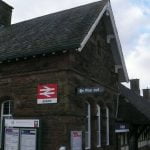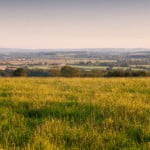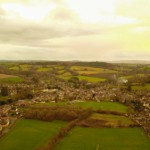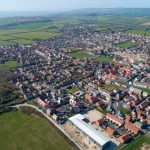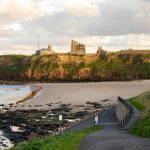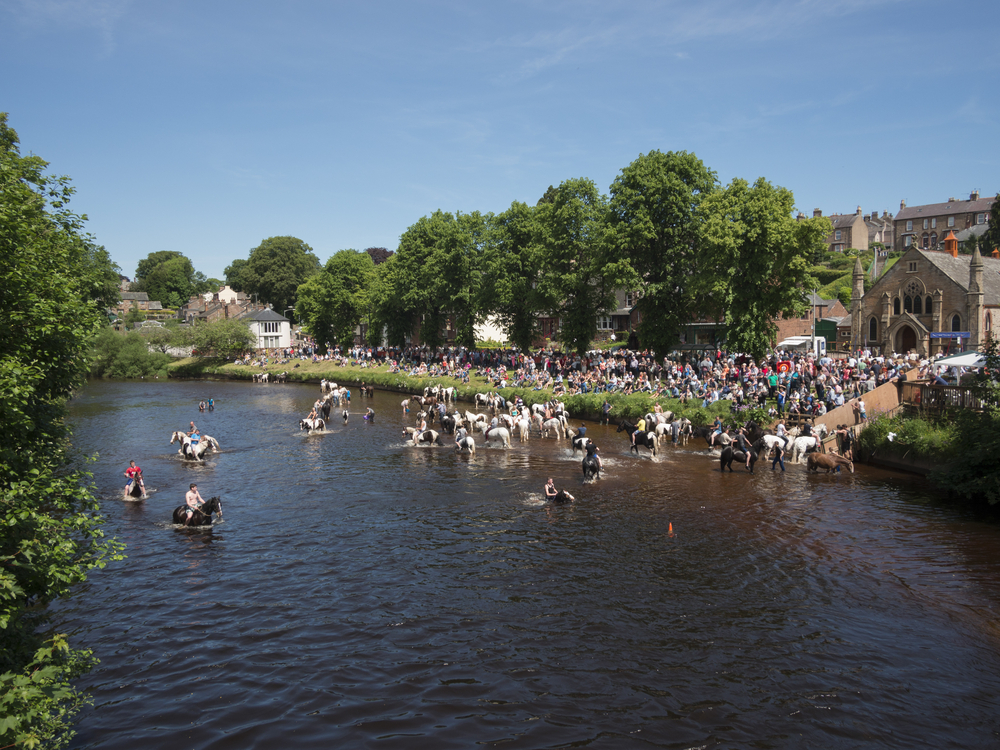
Appleby or Appleby-in-Westmorland to give it its full title is a market town and civil parish in the Eden district of the county of Cumbria, north-west England, situated on the banks of the River Eden. Before 1974, the town was simply called Appleby and served as the county town of Westmorland.
However, following the 1974 local government reorganisation and the dissolution of Westmorland, the local council decided in the town’s name change to preserve the historic county name. In the 2011 census, the population of the town was established as 3,048.
A Fleeting History
The Iron Age Celts were the first known people to inhabit the Appleby area. And although the Romans were certainly active in the district, it was the 9th century Vikings who first established a settlement, as a small collection of farmsteads, in Appleby’s Bongate area. The new settlement was named Appleby, from the Norse for ‘the place of apples’.
When the Normans invaded England in 1066, Appleby was under the control of the Scots. In 1092, William Rufus seized much of the border region back from the Scots invaders, erecting a basic fortification at Appleby. The Norman warlord, Ranulf le Meschin, was assigned the task of retaining the newly conquered lands, and subsequently built a baronial castle at Appleby around 1100. He retained the seat at Appleby Castle until 1121 when he left the area to take up his inherited position as the Earl of Chester, which led to the castle being returned to the Crown.
The Founding of the Town
Appleby itself originated as a 12th century planted borough, laid out at the foot of the castle. The ‘new’ town initially consisted of the wide, laid out street of Boroughgate, which had its own parish church of St Lawrence. In 1179, the ‘new’ Appleby was granted borough status by Henry II, but the earlier settlement of Appleby, which lay across the River Eden in St Michael’s parish, in Bongate, was not included in the decree.
Also, in the 1170s, Appleby gained a market charter and became the main trading centre for the upper Eden valley, holding cattle fairs every fortnight between March and September. Nonetheless, Appleby’s growth was severely limited during the late medieval period, due to the effects of constant Scottish raids and economic depression. In 1528, eminent poet and philosopher of the era, John Leland, was impelled to describe Appleby as ‘‘the Shire town, but now a poor village’’.
Henry Clifford Takes The Castle
By 1540, Appleby Castle had fallen into the ownership of Henry Clifford, but again the building was to sustain damage due to cross-border clashes by the Scots. In 1649, Appleby’s most celebrated daughter, the widowed Lady Ann Clifford, claimed her inheritance, moved to the town and took up residence at the castle. She spent the rest of her life restoring the castle to its former glory. Lady Anne also footed the bill for the building of St Anne’s Hospital and much of Boroughgate, as well as the restoration of St Lawrence’s Church.
In 1743, a young George Washington was all set to follow in the footsteps of his father and two half-brothers in being educated at Appleby Grammar School. However, his father died suddenly, and the adolescent George, never had made the intended long voyage from Virginia, USA to Appleby to undertake his planned education there. However, despite missing out on his classical schooling at Appleby, he still managed to go on and make a bit of a name for himself.
Prime Minister
In 1783, Appleby was put into the national spotlight, as its standing MP, William Pitt the Younger, was elected as Prime Minister. The same feat was later achieved by another former MP, Viscount Howick, who in 1830 was elected as PM, serving under the title of Earl Grey. Ironically, his Great Reform Act of 1832, found Appleby being barred from parliamentary representation, due to local corruption. By this time, though nominally still Westmorland’s county town, Appleby, was already very much in the shadow of the nearby and the much larger town of Kendal.
Despite the connection to the country’s rail network in 1876, Appleby remained a very small country town. In 1861, the population of Appleby was only 960 but fell back to 850 in 1901. In that year, the population of the whole of the borough was a mere 1,764. By 1910, the town’s only industries of any note was a brewery and a factory producing mineral water. In 1931, Express Dairy, moved to the town to become a major employer. At the time, the town’s population was still only 1,618.
Modern Appleby
Since the latter part of the 20th Century, due to its favourable location of being close to the Lake District, the North Pennines and the Yorkshire Dales, Appleby’s economy has been very much focused on tourism. This has been particularly true since 1974, when it ceased to be a borough and county town, with loss of both status and jobs.
In 1997, Express Dairy finally closed, with the loss of around 100 jobs in total over the previous year. The Creamery at its peak in the late 1950s, had once had a workforce of over 250. Business nowadays in the town is mostly limited to light industry and services. Appleby Brewery is one of Cumbria’s newest micro-breweries.
Today’s Appleby, with more than an eye on the tourist pound, has a great selection of quality independent shops, cafes and delicatessens selling locally produced food and crafts. There is also has an outdoor market held every Saturday. Additionally, on the last Saturday of every month, ‘Hubcraft’ takes place at the Appleby Hub, which is an informal market, where local craftspeople and manufacture’s selling their produce.
Getting To Appleby
If you’re travelling by car, then for most drivers it’s probably easiest to reach Appleby, exiting Junction 40 of the M6 at Penrith, and then traversing the A66 westwards direct to Appleby. Alternatively, if your heading from the south, you could exit the M6 at Junction 38, and take the more scenic B2620, following the signs to Appleby. From the east of the country, you would head west along the A66, via Scotch Corner.
Appleby railway station lies on the Carlisle to Settle line, considered to be the country’s most scenic rail route. Appleby is approximately a 40 minutes journey from Carlisle and about 2 hours from Leeds. You can easily connect to Carlisle station from any major city in the country.
Appleby can be reached by bus from Penrith, via Kirkby Thore and Temple Sowerby. The service is operated by Stagecoach.
It’s easiest to reach Appleby from either Manchester or Leeds airports, as they have the best rail links to the town.
Places to see!
Appleby Castle
Appleby Castle is set just on the outskirts of the town. The grounds are listed as heritage parkland, and although privately owned, the general public is allowed to walk around the grounds. The spectacular 12th-century motte and bailey castle boasts one of the few remaining intact Norman keeps in the country. For those who can’t get enough of history, you can even stay at the castle.
Rutter Force
Rutter Force is an attractive waterfall, that lies beside an old mill just south of Appleby. You can reach the falls by car, or by following the footpath south from Colby Lane.
St Anne’s Hospital
Standing in the town’s Boroughgate is a striking 17th-century red sandstone building, known as St Anne’s Hospital. It is not a hospital in the modern sense, but an almshouse. It was founded in 1652, by Lady Anne Clifford, to provide housing for 12 ‘sisters’ under a superior. The building is laid out around a courtyard and a central fountain, with the accommodation units on all sides, and a common hall and chapel in the corners.
Things to do!
Appleby Horse Fair
The town now enjoys international repute due to the annual Appleby Horse Fair, so if your planning a trip to Appleby why not go in June to see it? The event, which dates back to around 1685, is held in June every year at the town’s Fair Hill. It’s the UK’s foremost annual cultural gathering for gypsies and travelling people. However, it also attracts huge numbers of visitors who come to witness the horse sales and other gypsy traditions. The fair takes place in the first week in June from Thursday to the following Wednesday but is essentially a weekend event.
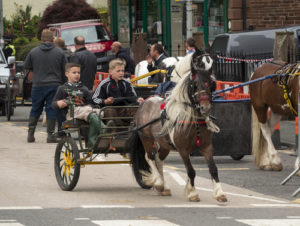
Appleby Horse Fair is held every June
Hiking and Biking
Appleby lies at the heart of the Eden Valley but is also close to the North Lakes, the North Pennines, and the Yorkshire Dales. Thus, the town makes an ideal centre from which to explore some of the country’s best scenery either on foot or by cycling. The Dales Highway, The Westmorland Way, Lady Anne’s Way, and The Pennine Way are all long-distance walking routes that pass through or close to Appleby.
The town also lies on the North Pennine and the Sea-to-Sea (C2C) cycle routes. It also has many local country roads that are part of the National Cycle Network. Some great rides can also be enjoyed around the Appleby area which is promoted locally as the ‘Do in a Day’ cycle routes. Appleby Tourist Information Centre provides comprehensive information on walking and cycling routes in the area.
Where to stay?
There is a good range of places to stay in and around Appleby from self-catering cottages to quality hotels, bed and breakfasts. A rough estimate of accommodation costs in and around Appleby is:
Guesthouse, B & B, Travel Lodge: £45 – £70
Standard Hotel: £70 – £90
3 & 4 Star Hotel: £90 – £150
Holiday home: £70 – £90 pp per night for max occupancy
Quiz Maker – powered by Riddle

